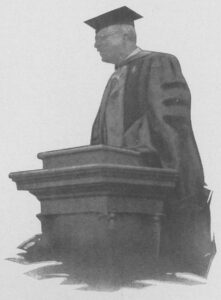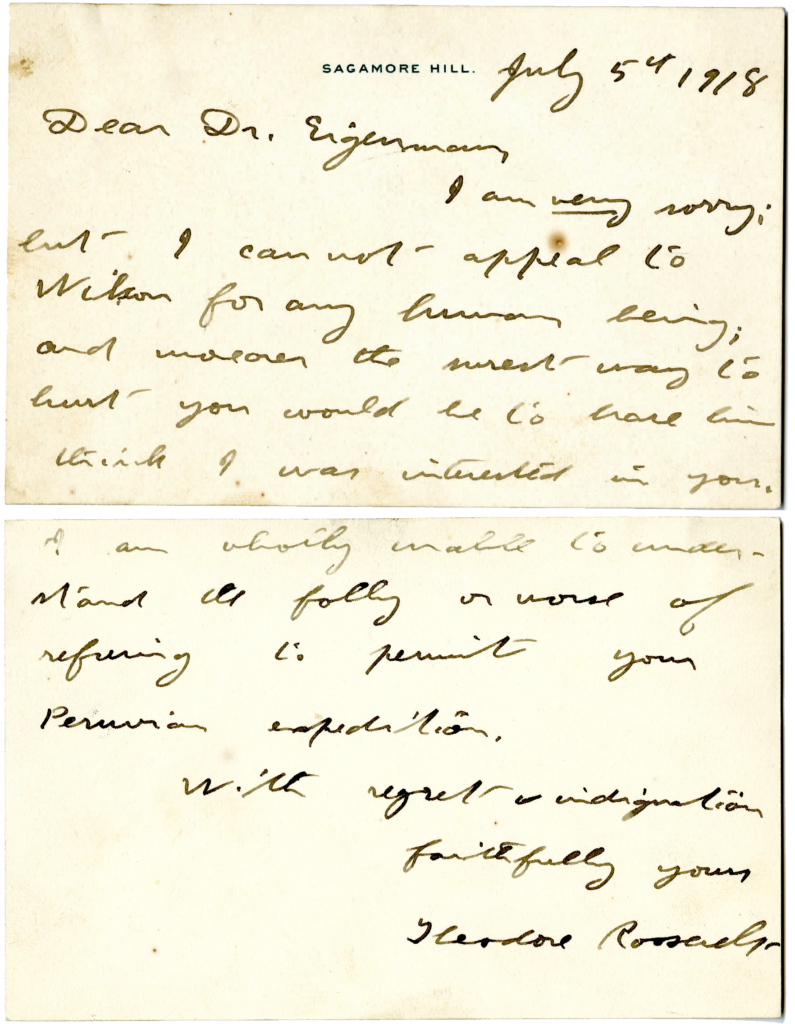When Carl Eigenmann (renowned ichthyologist, Indiana University Professor of Zoology and Dean of the Graduate School, and Curator of the Carnegie Museum of Natural History in Pittsburgh) set out on the 1918 Irwin research expedition to Peru, the possibility of failure was not far from his mind. He even wrote President Bryan a last will and testament of sorts, providing for the disposition of his research, specimens, and equipment “in case the submarines or other vermin should get [him].”
Yet it was not a German submarine that nearly scuttled Eigenmann’s expedition, but the U.S. State Department’s heightened scrutiny of German-Americans during World War I. After departing from Bloomington in June 1918, Eigenmann and his assistants, IU graduates Adele Eigenmann and W. R. Harris, were delayed in the port of New Orleans for five weeks. As Eigenmann, a German-born, naturalized U.S. citizen, put it, “The Passport Division of the State Department, while conceding that my name was euphonic, considered it too Teutonic and refused me passports.”
Indignant at the delay, Eigenmann went straight to the top with his protests. Besides writing to the presidents of IU and the University of Illinois, which granted Harris a fellowship for the journey, he appealed to former president Theodore Roosevelt and asked him to intercede with President Woodrow Wilson on his behalf.

Roosevelt’s well-known fascination with natural history, in particular with gathering specimens and trophies through large-scale, international expeditions, had made him a natural ally of Eigenmann’s in years past. In 1916, Roosevelt wrote to Gilbert Grosvenor, President of the National Geographic Society, to secure $3000 for the expedition, stating that Eigenmann was “of all the men in this country the one best fit to get the best results out of just this trip.”
Roosevelt also proved himself a friend of Indiana University in general, having given a rousingly patriotic commencement speech in Bloomington in May, 1918. But when Eigenmann requested his assistance in securing passports, he had not counted on the extent of the bad blood between Roosevelt and Wilson, who were campaign rivals during the 1912 presidential election and differed widely in attitudes toward American intervention in Europe during World War I. Roosevelt responded, apologetically, to Eigenmann’s request as follows:

SAGAMORE HILL.
July 5th 1918
Dear Dr. Eigenmann,
I am very sorry, but I cannot appeal to Wilson for any human being; and moreover the surest way to hurt you would be to have him think I was interested in you. I am wholly unable to understand the folly or worse of refusing to permit your Peruvian expedition.
With regret [and] indignation,
Faithfully yours,
Theodore Roosevelt
Despite Roosevelt’s unwillingness or inability to help him, Eigenmann’s other contacts were able to exert pressure on the authorities, and the expedition proceeded, albeit with a shortened itinerary. Eigenmann later reported that he suspected a rival scientist as the instigator of the passport controversy. As he wrote in his June, 1919 report to the Board of Trustees, “Someone, who I was informed was interested in having me vacate the position of Curator in the Carnegie Museum, filed charges against my loyalty.”
Who knew that the field of natural history could be so full of intrigue?
1 Comment
What connection did Pres. t. Roosevelt have to Burnettsville, Indinana?